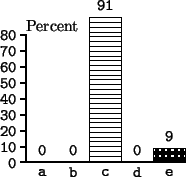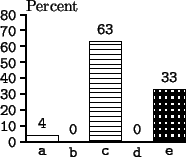|
|
|
|||||||||||||||
|
|
||||||||||||||||
|
Homepage > Assessment > Logic > Question 7 |
||||||||||||||||
|
|
||||||||||||||||
|
|
Philosophy
103: Introduction to Logic
Answer Choices: a. This answer means "All eyes that are healthy are eyes that see well," and this answer is consistent with converse by limitation "Some eyes that see well are healthy eyes. This latter statement is consistent with the statement in the question "Not all eyes that see well are healthy eyes." 12% of logic students are then partially correct. Answer a is implied; however, answer a is only part of the meaning of the original statement. b. This answer implies "All eyes that see well are healthy eyes," and this implication contradicts the original statement. c. The original statement implies "Some eyes that see well are healthy eyes," and "Some eyes that see well are not healthy eyes," but this answer is the converse of each of the two statements given in answer c. "Some healthy eyes are not eyes that see well" is not implied by the original statement. d. By contraposition, answer d is equivalent to "If your eyes see well, then your eyes are healthy"--the original statement denies this state of affairs. e. This answer, an imperative, is not relevant to the question asked. Evaluation: The answers to this question are fairly consistent across the disciplines. This type of question quite probably will show a substantial difference in assessment outcomes between logic and other courses when logic students begin to be aware of the logical operations of exclusive statements, contraposition, and modus tollens.. |
||||||||||||||
|
Send corrections or suggestions to webmaster@philosophy.lander.edu |
||||||||||||||||
|
Arguments | Language | Fallacies | Propositions | Syllogisms | Translation | Symbolic |
||||||||||||||||
|
|
. |
|
||||||||||||||



